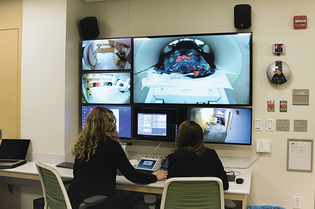
Dan Renzetti
Psychology professor Dylan Gee (right) and grad student Lucinda Sisk ’25PhD conduct an MRI scan. The Wu Tsai Institute will bring together faculty from psychology, neuroscience, and other disciplines.
View full image
There it sits, three pounds made weightless in cerebrospinal fluid: the brain. It gives us the world but reveals nothing of itself. We have spent decades deconstructing its processes, from the emotions it conjures to the chemicals that cross synapses. Nearly every academic discipline has lent tools to the effort. “All of these fields have been working, mostly independently, trying to solve problems that on their own are very difficult to understand,” says Nicholas Turk-Browne ’09PhD, a Yale psychologist. “The question is: how do you make sense of this broad range of information? How do you relate something as complex as thought, decision, or language to chemicals and synapses?”
A new gift to Yale by Joseph C. Tsai ’86, ’90JD, and his wife, Clara Wu Tsai, is targeting this monumental task of reunification. The Wu Tsai Institute, under Turk-Browne’s direction, aims to understand human cognition through three centers: the Center for Neurodevelopment and Plasticity (where does cognition come from?); the Center for Neurocognition and Behavior (what is cognition and how does it manifest?); and the Center for Neurocomputation and Machine Intelligence (how can cognition be modeled?). The institute is a response to two of five investment priorities laid out in 2018 by the University Science Strategy Committee: neuroscience and integrative data science.
“Nobody, as far as I know, is attempting to do what this institute is attempting to do, at this scale and in such an organized way,” says Lisa Feldman Barrett, a neuroscientist at Northeastern University and Harvard Medical School who studies the systems that give rise to emotion. “Nick Turk-Browne is a brilliant neuroscientist, and he is also a forward thinker, so I am optimistic about what the institute will achieve over the next decade.”
The Wu Tsai Institute will open in fall 2022 on three floors of a high-rise at 100 College Street, near the medical campus. The departments of psychology and neuroscience will move there in full, along with faculty from several other departments. The physical colocation of different disciplines supports one of the institute’s core goals: connecting diverse faculty who are working, in their own ways, on questions of cognition.
Though it’s a great starting point, “it is not enough to just move individual labs to 100 College Street and hope they figure out the brain together,” Turk-Browne says. There will be internal grants to encourage high-risk, high-reward investigations. Workshops and conferences will merge disparate ideas. Research projects will be designed with the explicit goal of collecting data across scales, which Turk-Browne likened to combining photos from the Hubble telescope and the Perseverance rover to understand Mars: many pictures of the same process, from macro to micro, will help reveal underlying truths. The institute will also hire graduate students, postdocs, and faculty who are threading together several disciplines, in order to cultivate integrative thinking in the next generation of neuroscientists.
“The brain generates all the incredible aspects of life—our behavior, thoughts, memories, relationships, successes, education, and careers,” Turk-Browne says. “Every bit of human nature and society and culture is grounded in the brain and the interaction between brains.” Can we crack the mysteries of how this happens? It’s a tantalizing prospect, possibly within reach.
 loading
loading